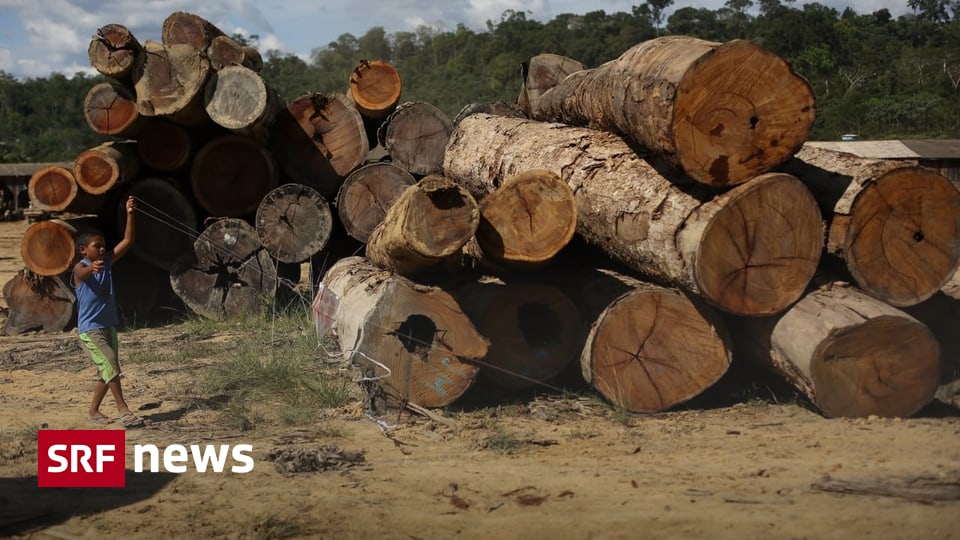Contents
Companies must prove that there is no deforestation in their products. This is what the EU demands. The Federal Council is still hesitant. The most important answers.
It’s all about this: Forests are being cleared elsewhere in Europe for consumption. This endangers biodiversity and the climate. This should now come to an end: from 2025, only products that do not involve deforestation will be allowed to be sold in the EU. The companies must be able to prove this. You must be able to trace every cocoa and soy bean back to the field. Because this is technically very demanding, smaller companies have a year longer to implement this due diligence.
Figures on global deforestation
This is why the EU regulation affects Switzerland: The rules apply to agricultural products for which forests are most often cleared – cocoa, coffee, palm oil, soy, beef, wood and rubber – as well as to products that contain them. They apply not only to EU companies, but also to all companies that want to export to the EU. The EU regulation therefore has an impact far beyond Europe and also in Switzerland: companies that want to continue exporting to the EU still have one year to implement the due diligence requirement.
Legend: A boy runs past piled up tree trunks. (State of Para, Brazil, 06/27/23) REUTERS/Nacho Doce
This is how Bern reacts: Various proposals are pending in parliament that demand that Switzerland adopt similar rules as quickly as possible. In principle, the Federal Council also wants this so that “there are no additional market access hurdles for Swiss companies,” as he said in his answer writes on a proposal. How and, above all, when exactly the Federal Council wants to implement this remains unclear. But that is exactly what is crucial for companies.
Nestlé and the WWF are putting pressure on: Time is running out, say Nestlé and the WWF, and the Federal Council must act quickly so that the EU can recognize the new Swiss rules as equivalent by the beginning of 2025. This is the only way no additional customs controls would be necessary. And they also show how this could work: together they commissioned a legal report that shows how the Federal Council could issue its own deforestation regulation.
WWF expert: “The regulation has a leverage effect”
Open box Close box
Agriculture is responsible for over 85 percent of global deforestation. The majority of these agricultural products are exported. European consumption is responsible for a total of 16 percent of global deforestation.
Romain Devèze, agricultural raw materials expert at WWF Switzerland, sees the EU regulation as a victory in the fight against deforestation: “The EU regulation gives real leverage in the producing countries.”
Switzerland must follow suit, says Devèze, because it also has to take responsibility. But that is also in the interests of the companies. Most Swiss companies are affected by the EU transparency rules anyway because they wanted to sell their products in the EU. “It would be easier for them if the same rules applied in Switzerland as in the EU.”
Daniel Imhof, Head of Agriculture at Nestlé Switzerland, explains: “We export a large part of our products to the EU and want to be able to do this in the future without any hurdles if possible.” That’s why Nestlé has been preparing for the new EU rules for a long time. Nestlé has been working on the traceability of the raw materials in its own products for years. “But proving 100 percent freedom from deforestation is a big challenge,” says Imhof. Without recognized Swiss rules, the data would then also have to be entered into the EU customs system.
The Federal Council under pressure: The EU deforestation regulation urges companies to act; these in turn build pressure on the Federal Council. The same could happen with a new supply chain law. Last week the EU introduced new rules that are strongly reminiscent of the Corporate Responsibility Initiative. These go much further than the rules that apply in Switzerland today. In the future, companies of a certain size will be responsible for ensuring that their subsidiaries comply with human rights and environmental standards. If they don’t do this, injured parties can sue in the EU. This rule also applies to Swiss companies as long as they have a turnover of at least 300 million in the EU. Here, too, the question arises whether Switzerland will follow suit to prevent it from going it alone.
